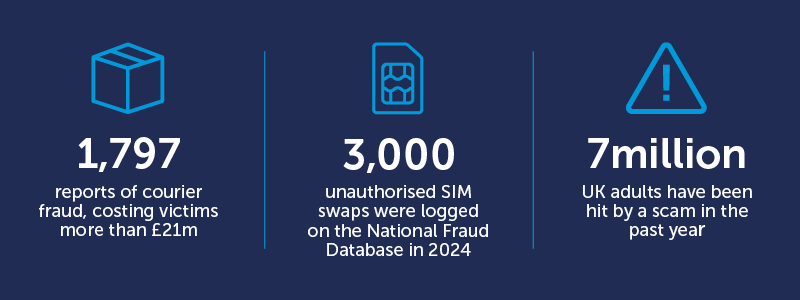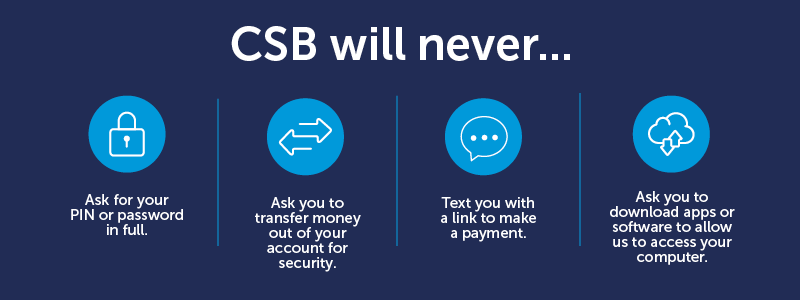3 scams you need to know

Scams are surging and there are three targeting savers like you. This International Fraud Awareness Week, we’re unpacking the latest scams you need to be aware of in 2025 – SIM-swap fraud, online shopping scams and courier fraud. Find out what you need to know to protect your savings.
SIM-swap fraud
Have you heard of SIM swapping? It’s when criminals hijack someone’s mobile phone number by transferring it to a new SIM card under their control.
We’re seeing a huge spike in fraudsters using this tactic. Nearly 3,000 unauthorised SIM swaps were logged on the National Fraud Database in 2024 – that’s an increase of more than 1,000% on 2023.1
You may have also heard about the recent cyberattacks on UK-based international retailers, data breaches like this are being used by SIM-swap fraudsters.
They’re also using phishing and social engineering to deceive and manipulate individuals into sharing their personal information. If you overshare your personal details online this could be another way they can collect your information – never publicly share your bank account details online.
They take the personal information they’ve gathered, contact the victim’s mobile provider posing as the customer and request a SIM swap, often citing a lost or stolen phone.
Once they’re in control of the number, criminals intercept one-time passcodes sent via SMS to take over the victim’s accounts. They can then use available websites and apps to apply for a bank loan, cancel holidays to get a refund or even steal wages from gig economy workers.
And it doesn’t stop there. Even if the SIM is recovered, fraudsters can plant backdoors such as password resets and link devices to gain repeated access or harvest sensitive data to sell on the dark web.
How to protect yourself:
- Protect your SIM card by enabling a PIN in your device’s settings menu and setting up a carrier level password or PIN with your network provider which must be verified before issuing a new SIM.
- Don’t respond to unsolicited emails, texts or phone calls.
- Don’t overshare personal details on social media. Avoid sharing your birth date or that of children or relatives or other common password recovery phrases such as the name of your first pet or school.
- Turn on Two-Step Verification (2SV), also known as two-factor authentication (2FA) or multi-factor authentication (MFA).
- Use a password consisting of three random words that only you know and which are unique. You could add uppercase letters, numbers and symbols to make it more secure.
- Always keep your device’s software up to date.
Three steps to take if you think your SIM card has been swapped:
- Call your network provider immediately. If you unexpectedly lose phone service, receive unsolicited texts or emails about your SIM being ported or a Port Authorisation Code (PAC) request, notify your provider.
- Inform your banks as soon as possible. The fraudster may attempt to make a money transfer online or over the phone.
- Record your details with Cifas. They’re a UK fraud prevention community.2

Online shopping scams
While SIM-swap fraud targets your mobile security, online shopping scams exploit your trust in e-commerce. Fraudsters use social media and auction sites to push fake listings, as well as create websites that imitate legitimate retailers. When buying tech, clothing or even cars at discounted prices, shoppers complete their order and receive products that are counterfeit, not as advertised, unsafe – or nothing at all.
The latest research from Citizens Advice shows more than 7m UK adults have been hit by a scam in the past year, with 26% duped while online shopping. Almost a quarter were pressured into transferring money and 42% were contacted through social media.3
What you need to watch out for:
- Offers that seem ‘too good to be true’, with huge discounts or unrealistic prices that are significantly cheaper than elsewhere.
- Are there any independent reviews, ratings, and customer experiences? Is there a lack of contact information? Check who you’re buying from; research the seller or retailer before you buy.
- Poor website quality with spelling errors, a misspelt URL or missing contact details.
- Unsecure payment methods. These can include bank transfers or gift cards. Always use credit cards or payment protection services when possible.
- Pressure tactics creating false urgency such as ‘limited time’ offers. Only criminals will try to rush or panic you.
- Phishing emails and messages pretending to be genuine retailers to trick you into giving away your details or buying something that doesn’t exist.
- Fake social media ads. Don’t click on the link in the ad, visit the retailer’s website directly from your browser.
Courier fraud
The third rising threat to be aware of is courier fraud. This is when a fraudster contacts you by telephone claiming to be a trusted authority such as a police officer, bank official or other credible figure. These criminals manipulate victims into handing over money, bank cards or valuable personal information, often involving a ‘courier’ to collect the items.
Courier fraudsters may target you by suggesting:
- There’s been a compromise on your bank card.
- Someone has been arrested in possession of your card, and they need you to assist in an undercover secret police operation.
- Sending a courier to collect your money, or bank card and PIN.
- Writing down your PIN and placing it in a separate envelope from that of your card.
The City of London Police, the national lead force for fraud, says victims are groomed through sophisticated phone scams, manipulated into believing they’re aiding investigations, then left financially and emotionally devastated. Over the past financial year there have been 1,797 reports of courier fraud, costing victims more than £21m, with an average loss per victim of just over £12,000.4
Three recent real-life courier fraud crimes:
- A fraudster claimed to be a DC and said the victim was “not allowed to tell anyone”. The victim lost £12K.
- A fraudster claimed to be a police officer and said someone has taken £3,000 from their account and was in custody. An informant stepped in to make a report to the police on behalf of their elderly neighbour. No financial loss.
- A fraudster claimed to be a police officer and wanted the victim to purchase gold as part of an investigation. The victim lost £138k.
How CSB can help
Here’s some useful information for our customers to keep your savings safe from scammers.

Not sure if you’re scam-savvy? You can always put your knowledge to the test with Take Five’s quiz.
We’re here to protect any savings you have with us. If you suspect you’ve been scammed there’s no need to feel embarrassed, the fraudsters want you to stay silent so it’s best to take immediate action – don’t delay, report it today.
Contact Charter Savings Bank: 0800 032 9999
Other contacts to help you fight fraud:
The Police: Dial 101 (or 999 if you’re in immediate danger). Visit police.uk/advice/advice-and-information/fa/fraud.
Report Fraud: Dial 0300 123 2040, Monday to Friday, 8am-8pm. Visit reportfraud.police.uk to report fraud 24 hours a day.
Financial Conduct Authority: Visit fca.org.uk to report an unauthorised firm or individual who may have tried to scam you with a financial service, such as your pension or taking out an investment.
For more expert fraud prevention advice and practical tips to keep your savings secure, visit our Fraud News Hub.
1 Experian Annual Fraud Fincrime Report 2025. P15.
2 Cyber protect: Protect yourself from SIM Swap Fraud
3 Millions stung by scams with online shopping the top trap, says Citizens Advice - Citizens Advice
4 City of London Police go for gold in courier fraud crackdown in Hatton Garden, with more than £21m lost in the last financial year | City of London Police
Fraud
Popular posts like this
- 3 scams you need to know
- Protecting yourself against winter scams, and what to do if you’re targeted
- The 5 biggest scams out there right now and how you can avoid them
- Helping you avoid scams?
- 5 ways to spot a scam website
- Scams | what to look out for
- Keeping your savings safe and secure
- Everything you need to know about Strong Customer Authentication (SCA)
- 7 Tips to stay safe on social media
Categories
More news
Financial Services Compensation Scheme
Your eligible deposits held by a UK establishment of Charter Savings Bank are protected up to a total of £120,000 by the Financial Services Compensation Scheme, the UK’s deposit protection scheme. Any deposits you hold above the limit are unlikely to be covered. Please click here for further information or visit www.fscs.org.uk.






